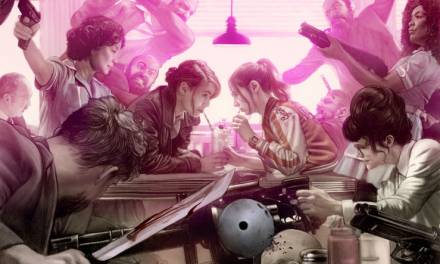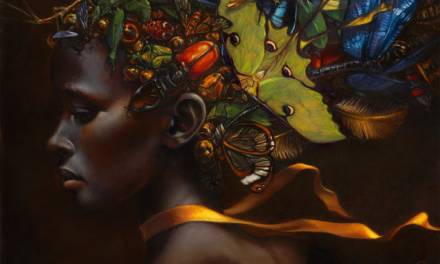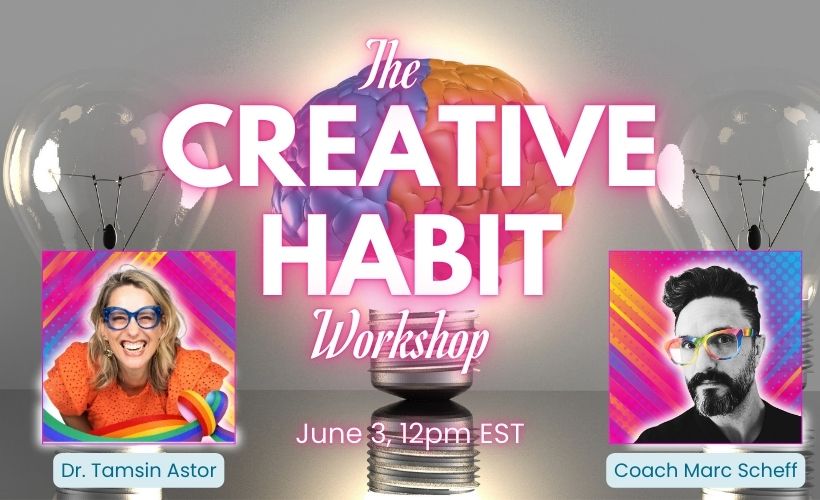A common question students ask is, “How do I become a better artist?”
The answer is easy, even if it sounds flip: “Work. Study. Experiment. Think. Try to connect with an audience. Work harder.”
The other most common question, whether asked directly or in a round-about way, is “What is the secret to being a successful artist?” Success meaning, for the sake of this post, being able to make a living creating art.
And that answer, too, is easy:
There isn’t one.
Muddy Colors has run some absolutely stellar posts in the past about portfolio construction or social media promotion or expanded educational opportunities. Read this, experience that, try this approach, discard that one: all of the advice is solid and worthwhile.
But there is no single formula for success: there’s no list that, once checked off, ensures…anything.
The hard truth is that it’s an extremely competitive market for painters, designers, illustrators, and sculptors, with lots of people with similar skill sets vying for the same jobs or gallery space. Technology has had both a positive and negative impact on the arts, on the one hand broadening exposure opportunities for creators and on the other devaluing art by making it seem both common and “free” (at least when it comes to the Internet). Societal shifts have impacted the retail environment which often can (and does, as we’re seeing now) translate into less work for artists: many traditional avenues for creatives have either constricted or disappeared entirely while those that do remain have increasingly used price as a deciding factor in who and what they use for their goods, not quality. Political strife and economic uncertainty cause corporations to sit on their wallets rather than open them for new employees or for more experimental work or for sponsorship of the arts in general. Andy Warhol once said, “An artist is somebody who produces things that people don’t need to have.” I don’t agree: I believe that art (and thus the artists), regardless of the myriad forms it takes, is important to a more rounded, more fulfilled life. (That’s a conversation for another day.) But even as I don’t agree with Warhol (who made significantly more money in his lifetime than I ever will, which means he must’ve known something), I know from having worked in the corporate world for over 35 years that when times are tough, the artists (and the work they produce) are among the first the bean-counters deem expendable. (Partly because the business execs don’t understand how we artsy fartsy folk think, partly because they’re too dim to value what they themselves can’t do. If you see a corporation struggling or failing outright, much of their problem has to do with an inability to appreciate creativity and the creative thinkers who work for them. The more polite term for them is “Philistines.” The impolite, but more apt term is “Dumbshits.”)
It’s a tough world. And there’s no such thing as “fair.” I know artists that struggle to pay their bills and secure work who ideally should be courted and revered by clients and the public; I know other artists that have so much work they’re booked years in advance. Why is this guy hot and the other guy with similar abilities not? Oh, I’m sure with some thinking and sussing, some things might be pointed out or some opinions offered, but really…there’s no predicting who gets invited to the feast and who is left on the outside looking in. And for those who do achieve a measure of success…it’s not always easy to maintain. Styles and trends and tastes change without notice and the artist (while remaining true to themselves) has to change with them.
Because there’s no single secret to becoming a successful artist—or staying one.
Truthfully, when it comes right down to it, it should be obvious. Success hinges on the answer to the question opening this post: Work. Study. Experiment. Think. Try to connect with an audience. Work harder.
Plus one other important thing to mix in: Network. Talk to people. Don’t hole up in your studio and not interact with your fellow artists. Art can not created in a vacuum. Reading and maybe posting on a blog or website or on Facebook or Twitter are not substitutes for sitting across from your peers, looking in their eyes, and sharing experiences over drinks. Get the hell out of the house every so often and meet the people you respect and admire and who are doing the same things that you want to be doing. Don’t avoid conventions or classes or workshops because they’re “too far away” or “cost too much” or “I don’t fit in.” Any expense may result in some temporary belt-tightening, but it almost inevitably pays off in the long term. Don’t be a wallflower when social opportunities arise. Don’t wait for others (and this includes art directors, publishers, patrons, and gallery owners) to come to you: reach out to them. Grow your circle—in person—just as you grow your skill set. The more people you know, the more people will know what you do and what you’re able to bring to the table. And the more experiences you have, the more you interact with others, the more your artistic sensibility will grow and, in a perfect world, the more unique and, possibly, in demand your work will be.
Hmmm. Maybe that is a secret. If so…consider that cat has been let out of the bag.








Perfect post for a Monday! “Work. Study. Experiment. Think…” just got sharpied on my easel (where else do artist put their favorite quotes….)
Personally, I think
“Philistines.” The impolite, but more apt term is “Dumbshits.”
would make an awesome T-shirt;)
Great post. I love information like this. Especially the portion about the social aspects of art-making. I really should leave my house more often. 🙁
Good post. But I have to say, that for some of us, the cost of attending workshops and conventions doesn't involve just belt tightening. For some of us, the expense is impossible to pay. The irony is that the reason I can't attend these things is because I chose to go to school, and have enormous student loan debt to pay every month. Literally, every single dollar is accounted for. I am left with art openings and such, but there are precious few of those now. Do you have recommendations for people like me?
Can't believe you let the secret out of the bag Arnie.
Hmmm. A quick thought is to take advantage of networking opportunities close to home. A quick Google search for things going on in your area—art clubs, conventions, etc—might turn up some some options. Get to know people at the art supply store or comic shops or frame stores or galleries: when they hear about something interesting going on they'll be more likely to share if they know you're interested, too. Stay in contact with instructors and fellow students from school—again, they might pass along info or news that you may have missed. And when it comes to traveling to a convention, exhibit, or event and they budget is tight, there's a lot to be said for road-tripping with friends. In my youth, a batch of us would pile into a car and drive east or west to attend a convention, splitting the cost of gas and sharing a room. Even if it's only a day trip, there and back, there's a lot to be said for doing it with a group.
Great post! Thank you.
Ironically, the last time I really got into the swing of going out and networking I broke a leg and couldn't go anywhere for a year… That set me back big-time. Trying to make up for it when I can, though. Now I find the biggest difficulty is getting younger people to respond when I try to talk to them…
That is an excellent suggestion Mr Fenner.
Recently when I moved to a new city I didnt know where to look, so I went to a few of the fantasy art forums online and contacted some of the artists that had listed themselves in my area asking them if they would like to get together.
It turned out that many of them had been planning on meeting up anyway and before we knew it, we had a monthly hang-out. I think its been almost a year now since we began and its been an incredible way to meet other illustrators, both locally and folks just passing through town.
All for the cost of a few pints and bus fare (occasionally a cab ride).
Kind of a random question, but is there a preferred email or comment zone where people may send questions or suggestions to the muddy colors gang?
Arnie, I always enjoy your posts. I'm not an artist, but your “secret” is universal to any career or endeavor, so I don't think I'm too off base by adding my suggestion for the person interested in success: adapt.
I don't mean the “when in Rome….” interpretation of adapting. I think of adapting as evolving symbiosis – it's really the practical result of thinking and experimenting. Adapting is paying attention to yourself and your environment. Both can be changed for your betterment.
Just a little personal plug on the networking idea: respond to individuals asking about commissions or your originals. These are people who already like and are interested in your work. From my limited personal experience, several contributors to this blog have this down pat. You never know what will turn into a mutually beneficial long term relationship.
Let's see if I can limit my typos in this post. 🙂
But, yes, Elli: you got it! I'm not particularly comfortable going to places I've never been before or meeting new people—and I'm always nervous (and usually flustered) when doing any public speaking. But I've always found that once you start, the jitters disappear and it gets easier. Sometimes there are opportunities that only come around every blue moon and if you don't take advantage of them, all you have left in your pocket is an unanswered “what if I HAD done that?” question. And you literally never know where any social interaction may lead: maybe to jobs, maybe to close friendships. The arts community is both close-knit and, conversely, very welcoming, but it takes getting into the mix to find that out.
My late friend Dave Stevens never felt like he “fit in”, even though he knew hundreds of people, almost all of whom liked him and considered him a pal. But in the last years of his life he struggled to shake off the perception people had of him as a pin-up artist in an effort to become a more rounded painter. And he was doing it largely in isolation, taking as many painting classes as he could afford at the community college, but largely staying holed up in his studio and trying to learn on his own. And being frustrated most of the time. I wish that I could have hooked him up with Greg Manchess or Donato, not only for tips and suggestions, but mostly for the art talk with colleagues.
But I didn't share the Supre Secret Handshake, Bill. THAT would be telling!
I absolutely agree on all counts. And, again, you never know who knows whom or where any sort of social interactions may lead.
That it's not just about becoming a career artist but about STAYING ONE is a great point. Perhaps it's also about maintaining the 'posture' of a successful artist regardless of the marketplace. If you have overcome an obstacle and created something today that's better than what you created yesterday, if your bills are paid one way or another, circumstances be damned. You are a successful artist.
Welllll – to the NYC artists reading these words: hoping to see you 7/28 at AFTH2012, a pop-up artist cooperative (and gem of a meeting place). I can sell it cause I believe in it: a party/show with a profit distribution model… http://vanderbiltrepublic.com.
Peace,
G.
Well there is a way to be a successful artist in the gallery world and that is to do something different and remain vague so that people think your telling them something.
That's a terribly generalist reply. Are you bitter about something?
Thank you for the inspiring advice 🙂
This is not far from something I've realised myself – unfortunately group situations/classes/talks are particularly difficult for me due to deafness. Oh well. Must try harder . . . . (and thank heavens for the internet!)
“I know artists that struggle to pay their bills and secure work who ideally should be courted and revered by clients and the public”
This pretty much is Out of Step Arts in a nutshell. Great article, Arnie!
best page i hare seen